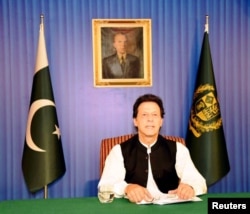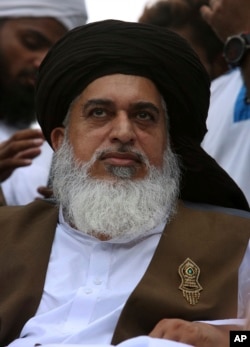Thousands of protesters from Tehreek-e-Labbaik Pakistan (TLP), an extremist religious-turned-political party, started a march from Lahore to Islamabad on Wednesday, demanding that the newly elected government cut diplomatic ties with the Netherlands and expel its ambassador.
The protest comes in the aftermath of a Dutch lawmaker's announcement of a cartoon contest centered on Islam's Prophet Muhammad. The competition was reportedly scheduled for later this year.
Thursday in Amsterdam, the lawmaker, Geert Wilders, said he was cancelling plans for the cartoon contest because the danger of violence against innocent people was too great.
TLP emerged last year and is a strong proponent of the country's controversial blasphemy laws. TLP and its leadership openly justify violence to safeguard the honor of Muhammad and demand the death penalty for those who commit what they see as blasphemy.
"The government has just two options. Either cut the diplomatic ties with Holland, close its embassy in Pakistan and expel the Dutch ambassador, or kill us and send our dead bodies back to Lahore," Ejaz Ashrafi, TLP's spokesperson, told VOA.
"If the government will fulfill our demands, we can consider stopping this long march. Otherwise, we are ready to die in Islamabad for this cause and have already written our wills," Ashrafi added.
Government's response
Meanwhile, a delegation led by Noor-ul-Haq Qadri, the federal minister for religious affairs and interfaith harmony, assured TLP's leadership that the government was taking the matter seriously.
"The government is aware of the situation and is making efforts. Our foreign minister has spoken with his Dutch counterpart to discuss the blasphemous-cartoons issue. We will raise our voices in the upcoming United Nations gathering [General Assembly] in New York. We will also try to have an emergency meeting on the platform of the Organization of Islamic Cooperation," Qadri told VOA.
Mohammad Faisal, a spokesperson for Pakistan's foreign office, also tweeted Wednesday about the issue and said the government was discussing the matter with Dutch authorities:
In a speech to the Pakistani senate this week, Imran Khan, the country's newly elected prime minister, also addressed the matter and assured senators that the issue would be raised by Pakistan at the General Assembly.
"Very few in the West understand the pain caused to Muslims by such blasphemous activities," Khan said.
Dutch lawmaker
In June, Wilders announced a cartoon contest to depict Islam's prophet. He said the contest would be held at his party's parliamentary offices.
Wilder is a member of the Dutch Party of Freedom, the second-largest political party in the country. He is known for his anti-Islam views and has declared Islam a totalitarian ideology.
Last week, several thousand TLP followers and members launched a protest in Islamabad. Security forces intervened and barred angry protesters from pelting the Dutch Embassy in Islamabad with stones.
Following Wilders' announcement, a former Pakistan cricketer offered a $24,000 bounty on Wilders' life.
Blasphemy
Blasphemy remains a highly sensitive topic in Pakistan, where strong religious sentiments have led to mob violence and killings.
In 2011, Mumtaz Qadri, a policeman, assassinated Punjab's Governor Salman Taseer after Taseer demanded reforms to the blasphemy laws. Qadri was angry about Taseer's stance on blasphemy.
Qadri was later found guilty of murder and was hanged by the Pakistani government in February 2017. His grave has been turned into a shrine by supporters of his strict Islamist ideology.
TLP was formed in 2017 to impose Sharia (Islamic law) and to follow Qadri's legacy of not sparing anyone charged with committing blasphemy against Muhammad.
The party came into prominence after Khadim Rizvi, TLP's founder, along with thousands of his followers, staged a sit-in in Islamabad last year that paralyzed the city for over 20 days.
At the time, TLP accused the government of committing blasphemy for attempting to modify a parliamentary bill related to the Khatam-e-Nabbuwwat oath, which affirms the end of prophecy, with Muhammad being the last prophet.
According to the existing law, every Muslim serving in the government in Pakistan has to take the oath and believe in the closure of prophecy after Muhammad.
Critics charge the oath has been used to persecute minority groups such as the Ahmadi religious minority, which considers itself an adherent of Islam but does not believe in the end of prophecy.
Kunwar Rehman Khan of VOA's Urdu Service contributed to this report.








